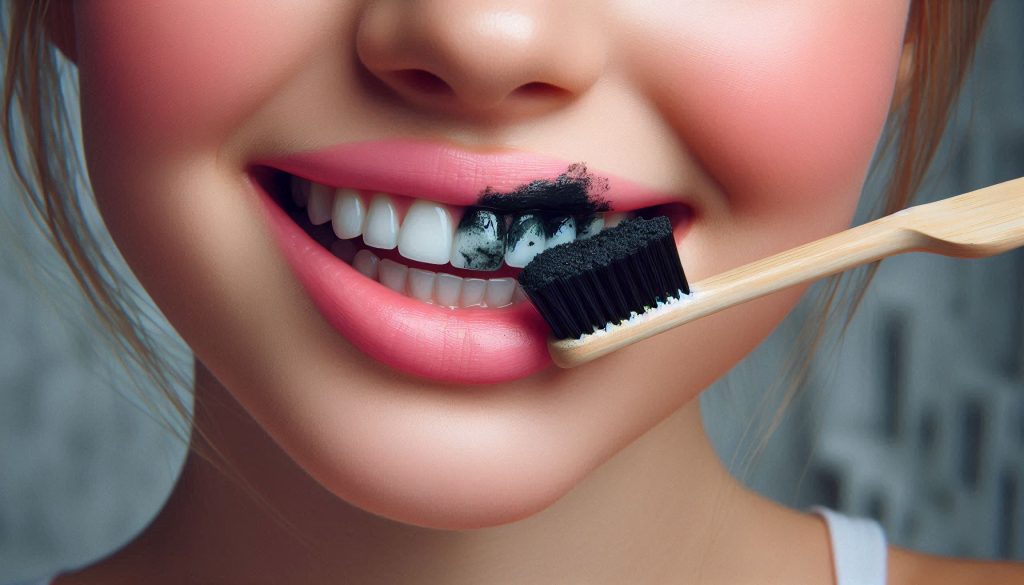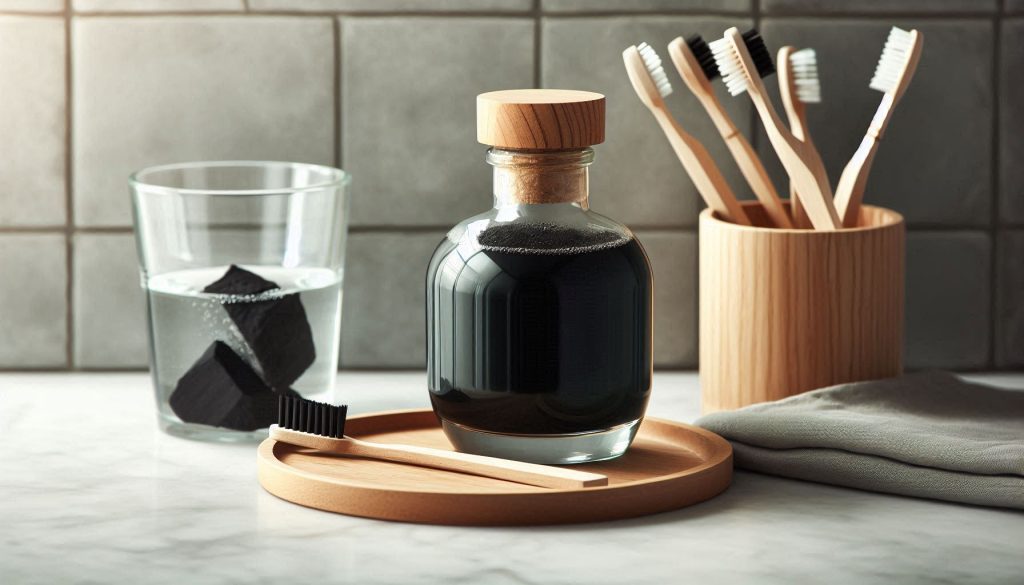For centuries, people have used charcoal in a variety of medical and wellness procedures. Activated charcoal has become more well-known in the field of dentistry in recent years. It is frequently promoted as a natural solution for teeth whitening and enhancing oral health. Though the hype around charcoal may be alluring, it’s critical to comprehend its function, advantages, dangers, and recommended usage in dental care. This in-depth essay will explore the science of charcoal use in dentistry, discuss its advantages and disadvantages, and offer recommendations for optimal usage.
A type of carbon called activated charcoal has been treated to create tiny, low-volume pores that expand the surface area that can be used for chemical reactions or adsorption. Because of its porous structure, activated charcoal can absorb poisons and chemicals and is therefore excellent for treating wounds, purifying water, and even providing dental care. In order to create activated charcoal, carbon-rich materials like wood or coconut shells must be heated to extremely high temperatures while being exposed to gases, which causes the carbon to become porous. Activated charcoal’s huge surface area is what allows it to absorb materials.

Benefits of Charcoal in Dental Care
1. Teeth Whitening:
One of the primary reasons people use activated charcoal in dental care is for teeth whitening. Activated charcoal is believed to bind stains and toxins on the teeth, removing surface discoloration and leaving the teeth looking whiter. The porous nature of activated charcoal allows it to interact with compounds that cause staining, such as coffee, tea, and red wine. Distinct results appear in an analysis of studies on activated charcoal for teeth whitening. While some studies find little to no effect, others suggest that activated charcoal can improve the appearance of tooth whitening. Rather than a chemical reaction, the whitening effect could be the result of the charcoal’s physical abrasive activity.
2. Bad Breath:
Activated charcoal can be effective in combating bad breath by adsorbing sulfur-containing compounds that are often produced by bacteria in the mouth. These compounds, such as hydrogen sulfide, are typically responsible for the unpleasant odor associated with halitosis. By binding to these odor-causing substances, activated charcoal can reduce their concentration in the mouth, leading to fresher breath. This process may also help neutralize other odorous compounds, further improving overall breath freshness.
3. Detoxification:
Activated charcoal is touted for its detoxification properties in oral care. The porous structure of activated charcoal allows it to attract and trap toxins and bacteria that accumulate in the mouth. This adsorption process helps to remove harmful substances that contribute to poor oral hygiene and can potentially support overall oral health. By reducing the number of toxins and bacteria present, activated charcoal may help in maintaining a cleaner, healthier mouth and potentially reduce the risk of oral infections.
4. Gum Health
Activated charcoal might benefit gum health by reducing inflammation and lowering the bacterial load in the mouth. The adsorption of bacteria and toxins can help alleviate gum irritation and support a healthier gum environment. By decreasing the number of harmful bacteria, activated charcoal may contribute to lessening gum inflammation and promoting overall gum health. However, while these effects are promising, further scientific research is needed to confirm the extent of activated charcoal’s impact on gum health.
Using Charcoal for Oral Health
Activated charcoal can offer various benefits for oral health, including fresh breath and teeth whitening. Here’s how you can incorporate charcoal into your daily dental care routine:
1. Charcoal Toothpaste
How to Apply:
- Store-Purchased Choice: Look for toothpaste that contains activated charcoal.
- Dilution: Mix a small amount of powdered activated charcoal with your regular toothpaste. Brush your teeth as usual.

Advantages: Charcoal toothpaste may help in whitening teeth and removing surface stains. However, it’s important to use it cautiously to avoid potential enamel wear.
2. Teeth Whitening with Charcoal
How to Apply:
- Method 1: Wet your toothbrush, dip it into activated charcoal powder, and gently brush your teeth for two minutes. Rinse thoroughly, then brush with regular toothpaste.
- Method 2: Mix activated charcoal powder with a small amount of coconut oil to form a paste. Apply the paste to your teeth, leave it on for 5-10 minutes, then rinse and brush with standard toothpaste.

Advantages: This method can enhance teeth whitening and help remove surface stains. Use 2-3 times a week to prevent excessive strain on enamel.
3. Charcoal Mouth Wash
How to Apply:
- Dilution: Dissolve half a teaspoon of powdered activated charcoal in a cup of water. Swish around in your mouth for one to two minutes, then rinse thoroughly with plain water.
- Store-Purchased Choice: Some mouth rinses contain activated charcoal as an ingredient.

Advantages: Charcoal mouth wash can help improve oral hygiene and reduce odor. Ensure not to ingest the mixture and rinse your mouth thoroughly.
4. Charcoal for Odor Reduction
How to Use:
- Chewable Tablets: Chew activated charcoal tablets to help combat bad breath.
- Dilution: Create a paste with activated charcoal powder and water, apply it to your tongue, then gently brush it off.
Advantages: Charcoal can assist in neutralizing odor-causing substances. Use this method sparingly to avoid potential irritation.
5. Charcoal for Healthy Gums
How to Apply:
- Gum Massage: Mix a small amount of powdered activated charcoal with coconut oil. Gently massage the mixture into your gums with your finger for a few minutes, then rinse thoroughly.
Advantages: This practice may help reduce gum disease and inflammation. Be gentle to avoid irritating your gums.
Advice for Safe Use:
- Moderation: Use charcoal treatments 2-3 times a week to prevent gum irritation and enamel damage.
- Rinse Well: Thoroughly rinse your mouth to remove charcoal residue.
- Consult Your Dentist: Before starting charcoal-based treatments, consult your dentist to ensure they are suitable for your dental health needs.
Issues and Safety:
- Teeth Enamel Loss: The abrasive nature of activated charcoal raises a serious concern when it comes to oral care. The grainy texture of many dental products including charcoal may slowly dissolve tooth enamel. Increased tooth sensitivity, color change, and even decay can result from enamel loss. It’s crucial to utilize less abrasive activated charcoal products and to speak with a dentist before adding them to your regimen.
- Gum Sensitivity: Gum irritation can result from using activated charcoal too regularly or in products with too much texture. The sensitive gum tissue may become irritated, painful, or even damaged as a result of this discomfort. This danger can be reduced by using charcoal products carefully and in accordance with prescribed guidelines.
- Repair Stain: Those who have dental restorations like veneers, crowns, or fillings may become discolored or stained after using activated charcoal. These materials may allow the charcoal to stick, giving the piece an ugly appearance. If you have dental work, you should use activated charcoal products with care.
- Inadequate Protection from Fluoride: The compound fluoride which is essential to dental care to strengthen enamel and prevent cavities, is not present in activated charcoal. You may lose out on the advantages of fluoride if you only use charcoal for oral hygiene. Fluoride is essential for maintaining the best possible dental health.
- Talk to your dentist: It’s important to speak with your dentist before adding activated charcoal to your dental care regimen. They may offer you customized guidance based on your needs regarding dental health and assist you in determining whether activated charcoal is a good fit for you.
- Select Items with Low Abrasiveness: If you choose to utilize activated charcoal, look for goods that are made with low abrasive content in mind. It is best to use premium charcoal-based toothpaste or powders that have undergone safety and effectiveness testing. Regular charcoal from a barbecue or other non-dental-grade sources shouldn’t be used because they can be excessively harsh and dangerous.
Charcoal’s Impact in Dentistry:
- Use in Moderation: Avoid overuse to prevent potential damage to gums and enamel. Most dentists recommend using charcoal products no more than once or twice a week.
- Maintain a Balanced Routine: Continue traditional oral care practices such as using fluoride toothpaste, flossing, and regular mouthwash.
- Monitor Side Effects: Watch for any negative effects like increased sensitivity or irritation. Discontinue use and consult your dentist if adverse symptoms occur.
Conclusion
Activated charcoal offers some benefits for dental care, including breath freshening and teeth whitening. However, it also presents risks such as enamel erosion and gum irritation. To ensure safe and effective use, incorporate charcoal sparingly into your routine, consult with your dentist, and maintain a comprehensive oral hygiene regimen. Further research is needed to fully understand charcoal’s long-term effects in dental care. Until then, use charcoal cautiously and in combination with conventional dental practices.
SOURCES
Dental and Implant Care: The Pros and Cons of Using Charcoal for Oral Care | Bell Dentist
Today’s Dental: What is the Truth Behind Brushing with Activated Charcoal Toothpaste?
Eastridge Dental: Benefits of Brushing Teeth with Charcoal
Dr Richard Clinics : Why charcoal is the hottest new ingredient in dental care?
HISTORY
Current Version
September 04, 2024
Written By:
SUMMIYAH MAHMOOD